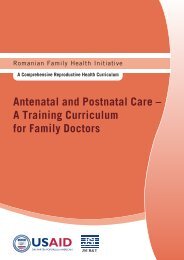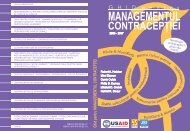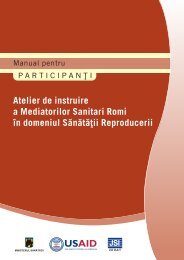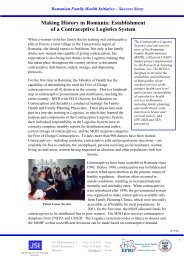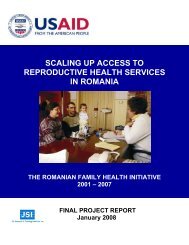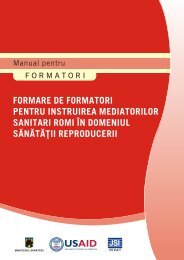Training of Roma Health Mediators in Reproductive Health
Training of Roma Health Mediators in Reproductive Health
Training of Roma Health Mediators in Reproductive Health
Create successful ePaper yourself
Turn your PDF publications into a flip-book with our unique Google optimized e-Paper software.
Tra<strong>in</strong>er document<br />
ESSENTIAL NEWBORN CARE<br />
Care <strong>of</strong> Cord<br />
The area around the cord stump should be kept clean and dry. It will dry and fall <strong>of</strong>f by<br />
itself with 7-10 days.<br />
Advice for the mother:<br />
• Fold the diaper so that it is below the stump.<br />
• Do not put herbs or other substances on the cord as they may cause severe<br />
<strong>in</strong>fection like tetanus and kill the baby.<br />
• If there is redness around the cord, a bad smell or discharge from it, take the baby<br />
to the health centre or call the family doctor at home.<br />
Breastfeed<strong>in</strong>g on Demand<br />
• All newborns must be kept with their mothers and put to the breast soon after<br />
birth.<br />
• Breastfeed<strong>in</strong>g the baby soon after birth and on demand (suckl<strong>in</strong>g him whenever<br />
he wants and for as long as he wants) has important advantages:<br />
o Breast milk `comes <strong>in</strong>' sooner<br />
o Baby ga<strong>in</strong>s weight faster<br />
o Fewer difficulties such as breast engorgement<br />
o Breastfeed<strong>in</strong>g is more easily established<br />
o Exclusive breastfeed<strong>in</strong>g for six months saves lives <strong>of</strong> many babies by<br />
prevent<strong>in</strong>g malnutrition and <strong>in</strong>fections like diarrhea and pneumonia.<br />
Gas Pa<strong>in</strong>s (Colic)<br />
If a baby starts to cry and pull his legs up soon after he starts to suck, he may have gas —<br />
too much air <strong>in</strong> the belly. Some babies swallow air when they breastfeed. It may help to<br />
let the baby burp:<br />
• Lay the baby on your shoulder and rub or pat his back, or<br />
• Lay the baby across your knees and rub or pat his back, or<br />
• Sit the baby up lean<strong>in</strong>g forward and rub or pat his back.<br />
Sometimes a baby seems to get gas pa<strong>in</strong>s when the mother eats certa<strong>in</strong> foods or spices.<br />
The mother can try eat<strong>in</strong>g food without spices, or stop eat<strong>in</strong>g a food that may be caus<strong>in</strong>g<br />
gas for 2 or 3 days (if she is gett<strong>in</strong>g enough nutrition from other foods). There is no<br />
particular food that should be avoided, because each baby is different.<br />
Gas pa<strong>in</strong>s usually stop when the baby is about 4 months old.<br />
Eye Care<br />
Clean each eye with a separate clean moist cloth or cotton swab, beg<strong>in</strong>n<strong>in</strong>g from external<br />
part <strong>of</strong> the eye to the nose. Do not put any drops <strong>in</strong> the baby’s eyes.<br />
135<br />
RFHI/JSI <strong>Roma</strong>nia <strong>Tra<strong>in</strong><strong>in</strong>g</strong> <strong>of</strong> RHMs <strong>in</strong> <strong>Reproductive</strong> <strong>Health</strong> Session 8: Newborn Care



